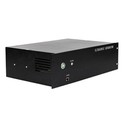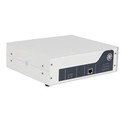Yo, folks! As a supplier of ultrasonic pipe filters, I've seen firsthand the ins and outs of these nifty devices in the chemical industry. They're pretty awesome, but like anything else, they come with their fair share of challenges. Let's dive right in and take a look at what you might face when using an ultrasonic pipe filter in this field.
1. Compatibility with Chemicals
One of the biggest headaches we often hear from customers is making sure the ultrasonic pipe filter is compatible with the chemicals they're dealing with. Chemicals in the industry can be super corrosive, reactive, or just plain harsh. You can't just slap any filter into the mix and expect it to work.
For example, some strong acids or alkalis can eat away at the materials used in the filter. If the filter housing is made of a metal that isn't resistant to a particular chemical, it'll start to corrode over time. This not only shortens the lifespan of the filter but can also contaminate the chemical process. You don't want bits of rust or other debris from the corroded filter getting into your precious chemicals, right?
To solve this, we've got to do our homework. We need to understand the exact chemical composition of what's going through the pipes. That way, we can recommend the right materials for the filter. Sometimes, it might mean using special coatings or more expensive, corrosion - resistant metals. It's a pain in the neck, but it's crucial for the long - term success of the filtration process. You can check out our Ultrasonic Pipe Filter page to see some of the options we have that are designed to handle different chemicals.
2. High - Frequency Ultrasonic Interference
Ultrasonic pipe filters rely on high - frequency sound waves to do their job. These sound waves help dislodge particles from the filter media, keeping it clean and allowing for better filtration. But here's the catch: in a chemical plant, there are often lots of other machines and equipment that also use high - frequency signals.


This can lead to interference. When the ultrasonic signals from the filter clash with those from other devices, it can mess up the whole filtration process. The filter might not clean itself properly, and the efficiency of particle removal can drop significantly.
We've had customers tell us that they noticed a decrease in filtration performance when they added new equipment to their plant. It took some detective work to figure out that it was due to ultrasonic interference. To deal with this, we sometimes have to adjust the frequency of the ultrasonic waves used by the filter. It's a bit of a trial - and - error process, but once we find the right frequency that doesn't clash with other signals, things usually start working smoothly again.
3. Maintenance and Cleaning
Maintaining an ultrasonic pipe filter isn't a walk in the park. Over time, even with the help of ultrasonic cleaning, some stubborn particles can still stick to the filter media. And if you don't clean it properly, it can lead to clogging.
Clogged filters are a nightmare. They reduce the flow rate of the chemicals through the pipes, which can slow down the entire production process. Plus, they put extra strain on the pumps and other equipment in the system.
Regular cleaning is a must, but it's not as simple as just hosing it down. We need to use the right cleaning agents that won't damage the filter or react with the chemicals it's been in contact with. And sometimes, we have to disassemble parts of the filter for a more thorough cleaning. This takes time and labor, and it can be costly, especially if production has to be halted during the cleaning process.
We also offer Ultrasonic Tank Filter solutions that might be easier to maintain in some cases. They can be a good alternative if the maintenance of a pipe filter becomes too much of a hassle.
4. Installation and Integration
Getting the ultrasonic pipe filter installed and integrated into an existing chemical process can be a real challenge. Every chemical plant has its own unique layout and set of requirements. The pipes might be different sizes, and the flow rates and pressures can vary widely.
If the filter isn't installed correctly, it won't work as intended. It might not fit properly into the pipe system, or the ultrasonic transducers might not be positioned correctly to clean the filter media effectively.
We've had to send our technicians to customer sites more than once to help with the installation. They have to measure everything carefully, make sure the filter is aligned properly, and connect all the electrical and plumbing components correctly. It's a time - consuming process, but it's essential to get it right from the start.
5. Cost - Benefit Analysis
Let's talk money. Ultrasonic pipe filters aren't cheap. They come with a relatively high upfront cost, and then there are the ongoing costs of maintenance, energy consumption, and replacement parts.
Some customers are hesitant to invest in these filters because they're not sure if the benefits will outweigh the costs. They might be used to traditional filtration methods that are cheaper in the short term.
But here's the thing: ultrasonic pipe filters can offer significant long - term savings. They can improve the quality of the chemicals being produced, reduce downtime due to clogged filters, and extend the lifespan of other equipment in the system. It's all about looking at the big picture. We work with our customers to do a detailed cost - benefit analysis. We show them how much they could save in the long run by using our ultrasonic pipe filters.
Why You Should Still Consider Ultrasonic Pipe Filters
Despite all these challenges, ultrasonic pipe filters are still a great option for the chemical industry. They offer a level of filtration efficiency that's hard to beat. They can remove even the smallest particles from the chemicals, ensuring a high - quality end product.
If you're facing issues with particle contamination in your chemical processes, or if you're tired of dealing with clogged traditional filters, it might be time to give ultrasonic pipe filters a try. We're here to help you navigate through all the challenges. Our team of experts can provide you with the right advice on installation, maintenance, and choosing the right filter for your specific needs.
If you're interested in learning more or discussing a potential purchase, don't hesitate to reach out. We're always happy to have a chat and see how we can help you improve your chemical filtration process.
References
- "Chemical Filtration Handbook": A comprehensive guide on filtration in the chemical industry, covering different types of filters and their applications.
- "Ultrasonic Technology in Industrial Filtration": Research paper that delves into the use of ultrasonic waves in filtration systems and the challenges associated with it.





